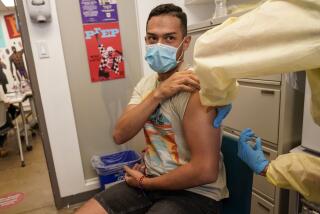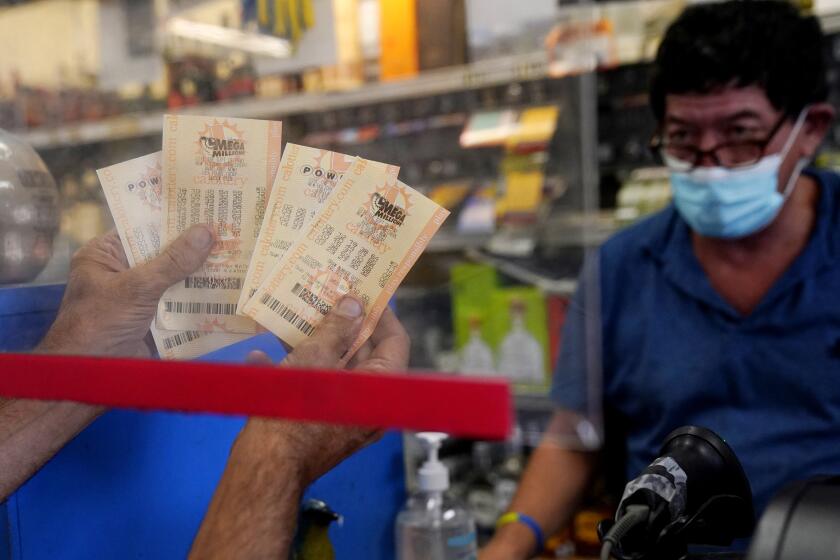Babies Get Early Protection With Hepatitis B Shots : Health care: The free immunizations by county are part of a national effort at long-term prevention.
- Share via
SANTA ANA — Violet Pasallo, only 2 months old, didn’t know she was a pioneer.
Lying in the arms of her mother Friday, the baby smiled as the Orange County public health nurse came forward with a hypodermic needle. But the smile turned into a startled look, and a wail followed when the nurse quickly stuck the needle in her. Violet now had one-third of the shots she would need to be immunized against a dreaded adult illness: hepatitis B.
She was one of the first to be inoculated under county’s new program, begun July 1 to vaccinate all babies against hepatitis B before they are a year old. Until this year, health officials in the nation had primarily concentrated on immunizing “high-risk” adults against hepatitis B, said Dr. Gerald Wagner, director of the County Health Care Agency’s immunization program.
“But that has not decreased the cases in the United States, and so now it is felt that immunization of infants over the long term is the best way to decrease cases in the country,” Wagner said.
Hepatitis B is an infection of the liver caused by a virus. The sickness usually begins with loss of appetite, extreme tiredness, nausea, vomiting and stomach pain. Dark urine and jaundice (yellow eyes and skin) also are common. The illness is fatal in some cases.
Wagner said hepatitis B most frequently hits people between the ages of 17 and 24.
“Therefore if this (infant immunization) program is successful, we won’t see a major change for about 15 to 20 years,” he said.
The hepatitis B virus is passed from one person to another through blood or certain body secretions. It may be transmitted during sex or through the sharing of toothbrushes, razors or needles to inject drugs. A baby can get hepatitis B at birth from its mother.
Spread of the virus is uncannily similar to how the AIDS virus is transmitted. The “high-risk” people for both illnesses are those who share needles or have casual sex.
During the past 10 years in Orange County, cases of hepatitis B rose in the early 1980s, reaching a peak of 565 cases in 1985. The number of cases then started declining, reaching a low of 107 in 1990, then rising slightly last year to 115 cases.
Wagner said the hepatitis B vaccine first came into use in 1984, which partly accounts for the drop in cases in Orange County and elsewhere after 1985. Also, education about sexually transmitted diseases increased during the 1980s because of AIDS, which probably also helped reduce hepatitis B cases, Wagner said.
While there is no vaccine against AIDS, there is an effective one against hepatitis B. Furthermore, health officials have found that the vaccine is safe, even for babies.
Earlier this year, the national Academy of Pediatrics and the federal Centers for Disease Control endorsed the concept of vaccinating all infants against hepatitis B.
To help launch the national immunization effort, the federal government gave $18 million to various states. California, which received $1.5 million of that amount, in turn distributes part of funds to Orange County to pay for the infant immunizations, Wagner said. So far, no limit had been put on the county’s hepatitis B funds.
Parents can have their babies immunized, free of charge, at county public health clinics, such as the one at 1725 W. 17th St., where Violet got her shot Friday. She will get the two remaining shots within the next six months.
Information about the nearest facility can be obtained by calling the Immunization Assistance Program at (714) 834-8586.
Wagner said there is no “income test,” but he urged parents who can afford private immunizations to have their pediatricians do it.
The overall goal, Wagner noted, is to raise a new generation resistant to a debilitating disease that last year struck 115 persons in Orange County and 300,000 throughout the rest of the nation.
“People sometimes forget the need for vaccinating because they forget what diseases are like,” Wagner said. “We still vaccinate for polio in Orange County, even though we don’t have any cases in this county. But over in Southeast Asia and Africa, polio struck thousands of persons last year.”
More to Read
Sign up for Essential California
The most important California stories and recommendations in your inbox every morning.
You may occasionally receive promotional content from the Los Angeles Times.













